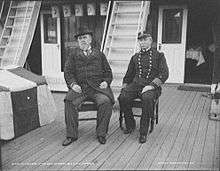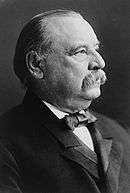Hilary A. Herbert
| Hilary Abner Herbert | |
|---|---|
 | |
| 33rd United States Secretary of the Navy | |
|
In office March 7, 1893 – March 4, 1897 | |
| President | Grover Cleveland |
| Preceded by | Benjamin F. Tracy |
| Succeeded by | John D. Long |
| Member of the U.S. House of Representatives from Alabama's 2nd district | |
|
In office March 4, 1877 – March 3, 1893 | |
| Preceded by | Jeremiah Norman Williams |
| Succeeded by | Jesse F. Stallings |
| Personal details | |
| Born |
March 12, 1834 Laurens, South Carolina, USA |
| Died |
March 6, 1919 (aged 84) Tampa, Florida, USA |
| Political party | Democratic |
| Alma mater |
University of Alabama University of Virginia |
| Profession | Politician, Lawyer |
| Military service | |
| Allegiance | Confederate States of America |
| Service/branch | Confederate States Army |
| Rank |
|
| Commands | 8th Alabama Infantry |
| Battles/wars | American Civil War |
Hilary Abner Herbert (March 12, 1834 – March 6, 1919) was Secretary of the Navy in the second administration of President Grover Cleveland. He also served as a member of the United States House of Representatives from Alabama.
Biography
Herbert was born in Laurensville, South Carolina in 1834, and moved with his family to Greenville, Alabama in 1846. He was educated at the University of Alabama and the University of Virginia, where he was a member of the Delta Kappa Epsilon fraternity (Eta chapter). He practiced law in Greenville until the Civil War.
Herbert entered the Confederate Army as a second lieutenant. He served as captain of the Greenville Guards, and was later promoted to the rank of colonel of the Eighth Regiment, Alabama Infantry. Herbert was wounded at the Battle of the Wilderness May 6, 1864.

After the war, Herbert returned to his law practice in Greenville, Alabama. He was elected to Congress in 1877 from Montgomery, Alabama as a Democrat. He served eight terms in this office. During his tenure as Congressman, Herbert was chairman of the Committee on Naval Affairs and was largely responsible for the increased appropriations which led to the revival of the United States Navy. However, he was among those who favored a more limited program than the one proposed by Secretary of the Navy Benjamin F. Tracy in 1890, which called for 40 battleships; only four battleships were authorized as a result.[1] Tracy had been influenced by the works of naval strategist Captain Alfred Thayer Mahan, which called for a large fleet capable of offensive action.[2] Herbert also became well known for leading a charge in Congress to reduce the funding of the United States Geological Survey, resulting in a public feud with paleontologist Othniel Charles Marsh.
In 1893, President Grover Cleveland appointed Herbert as Secretary of the Navy. By this time Herbert was able to muster support for an enlarged navy, despite the Depression of 1893, and brought the fleet to some level of preparedness for the Spanish–American War. Having converted to Mahan's school of naval thought, five battleships (the Kearsarge and Illinois classes) and sixteen torpedo boats were authorized during Herbert's tenure.[3][4] From 1897, when he left his Cabinet seat, to his death on March 6, 1919, Herbert practiced law in Washington, D.C.
Namesake
USS Herbert (DD-160) was named in honor of Secretary Herbert.
References
- Bauer, K. Jack; Roberts, Stephen S. (1991). Register of Ships of the U.S. Navy, 1775–1990: Major Combatants. Westport, Connecticut: Greenwood Press. ISBN 0-313-26202-0.
- Friedman, Norman (1985). U.S. Battleships: An Illustrated Design History. Annapolis, Maryland: Naval Institute Press. ISBN 978-0-87021-715-9.
- Hammett, Hugh B. Hilary Abner Herbert: A Southerner Returns to the Union. Philadelphia: American Philosophical Society, 1976
- Herbert, Hilary Abner. The Abolition Crusade and its Consequences; Four Periods of American History. New York: Scribner’s Sons, 1912.
External links
-
 Media related to Hilary A. Herbert at Wikimedia Commons
Media related to Hilary A. Herbert at Wikimedia Commons - Works by Hilary A. Herbert at Project Gutenberg
- Works by or about Hilary A. Herbert at Internet Archive
- United States Congress. "Hilary A. Herbert (id: H000524)". Biographical Directory of the United States Congress. Retrieved on 2008-02-13
 This article incorporates public domain material from websites or documents of the Naval History & Heritage Command.
This article incorporates public domain material from websites or documents of the Naval History & Heritage Command.- "Hilary A. Herbert". Find a Grave. Retrieved 2008-02-13.
| U.S. House of Representatives | ||
|---|---|---|
| Preceded by Jeremiah Norman Williams |
Member of the U.S. House of Representatives from Alabama's 2nd congressional district 1877–1893 |
Succeeded by Jesse F. Stallings |
| Government offices | ||
| Preceded by Benjamin F. Tracy |
United States Secretary of the Navy 1893–1897 |
Succeeded by John D. Long |




